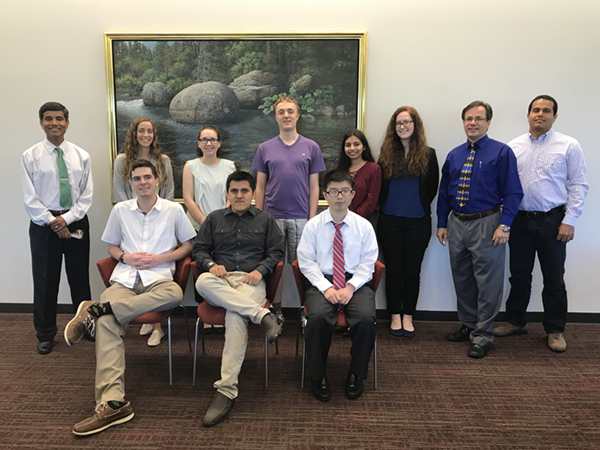LU serves as undergraduate research site for eight students in 10-week NSF program
 Lamar University recently hosted two research teams comprised of eight students and four faculty members in the Research Experiences for Undergraduates (REU) program funded by the National Science Foundation. The $263,980 NSF grant will support additional students and junior faculty in the summers of 2019 and 2020.
Lamar University recently hosted two research teams comprised of eight students and four faculty members in the Research Experiences for Undergraduates (REU) program funded by the National Science Foundation. The $263,980 NSF grant will support additional students and junior faculty in the summers of 2019 and 2020.
The 10-week research and academic experience at LU’s REU site offered sophomores, juniors, and seniors from accredited U.S. colleges or universities the opportunity to perform summer research in the fields of big data analytics, data dimension reduction, matrix factorization and graph theory. REU at LU was designed to spark and sustain a new excitement about undergraduate research in mathematics and statistics. The program focuses on non-traditional students, including community college students, veteran students and students from underrepresented groups.
In addition, the program will train young faculty as mentors to undergraduate researchers. This summer, and for the next two summers, the program will support two research teams, each composed of two faculty members and four students.
“Students had the opportunity to develop their research, writing, presentation and teamwork skills,” said Kumer Das, professor of mathematics and director of Office of Undergraduate Research. “Likewise, junior faculty developed their mentoring skills through co-mentoring experiences and additional synergistic activities. The research experience was complemented by several organized outings and educational activities.”
Joining Das as a co-primary investigator in the program is Jennifer Daniel, associate professor of mathematics who holds a Ph.D. from North Carolina State University. Joining them are Jasdeep Pannu, assistant professor of mathematics, who holds a Ph.D. from Auburn University, and Jose Vega-Guzman, assistant professor of mathematics, who holds a Ph.D. from Arizona State University.
“This program will have a profound effect by providing an enriched experience to students who are traditionally underrepresented in STEM disciplines,” Das added.
Each day of the program consisted of mentor/student and student/student discussions, and the program included presentations addressing subjects such as the importance of research, publishing in the mathematical sciences, and other activities, said Das.
For students, the immersive experience allows them to understand the research process.
“The research topics include several interesting, accessible projects in matrix factorization, graph theory and statistics,” Das said. “Each is sufficiently novel and significant to
warrant publication in refereed journals.” Research papers will be submitted for publication in refereed journals, Das said.
“It’s an enriching thing to experience,” said Jorge Villarejo Morena, Lamar senior and REU participant. “At first, we felt like we didn't have guidelines when we were not given specific projects to work on. Instead, we were given the choice to look for topics ourselves depending on our interests. In the end, we have realized this is a true research experience.”
“This is my first opportunity to do research, so I am getting a feel for it which will help me decide if research or graduate school in statistics and math is the right path for me,” said Rebecca Teske, a mathematics major from Grinnell College participating the REU program. “I also hope that by working with medical data I will be eligible for job opportunities that involve data analysis in the medical field.”
The Research Experiences for Undergraduates (REU) program supports active research participation by undergraduate students in any of the areas of research funded by the National Science Foundation. REU projects involve students in meaningful ways in ongoing research programs or in research projects specifically designed for the REU program.
“The long-term goal is to increase the participation of underrepresented groups in mathematical research and graduate training,” Das said. “By building students’ confidence through success in mathematical research, they will go on to succeed in graduate school and to inspire future generations.”


